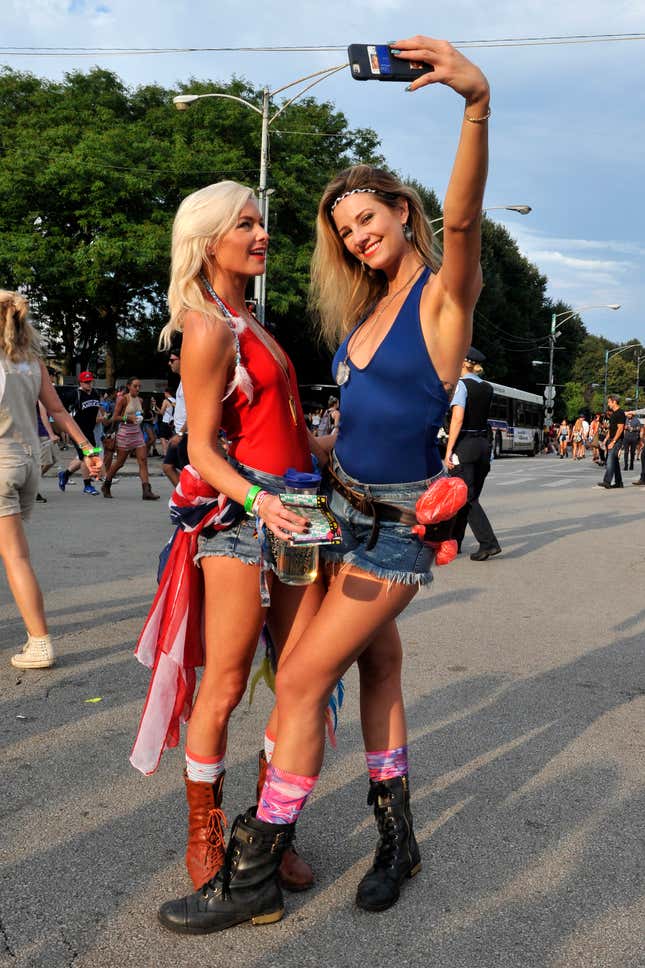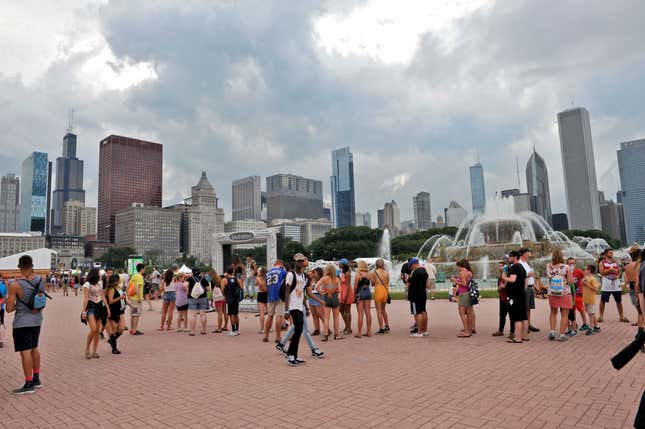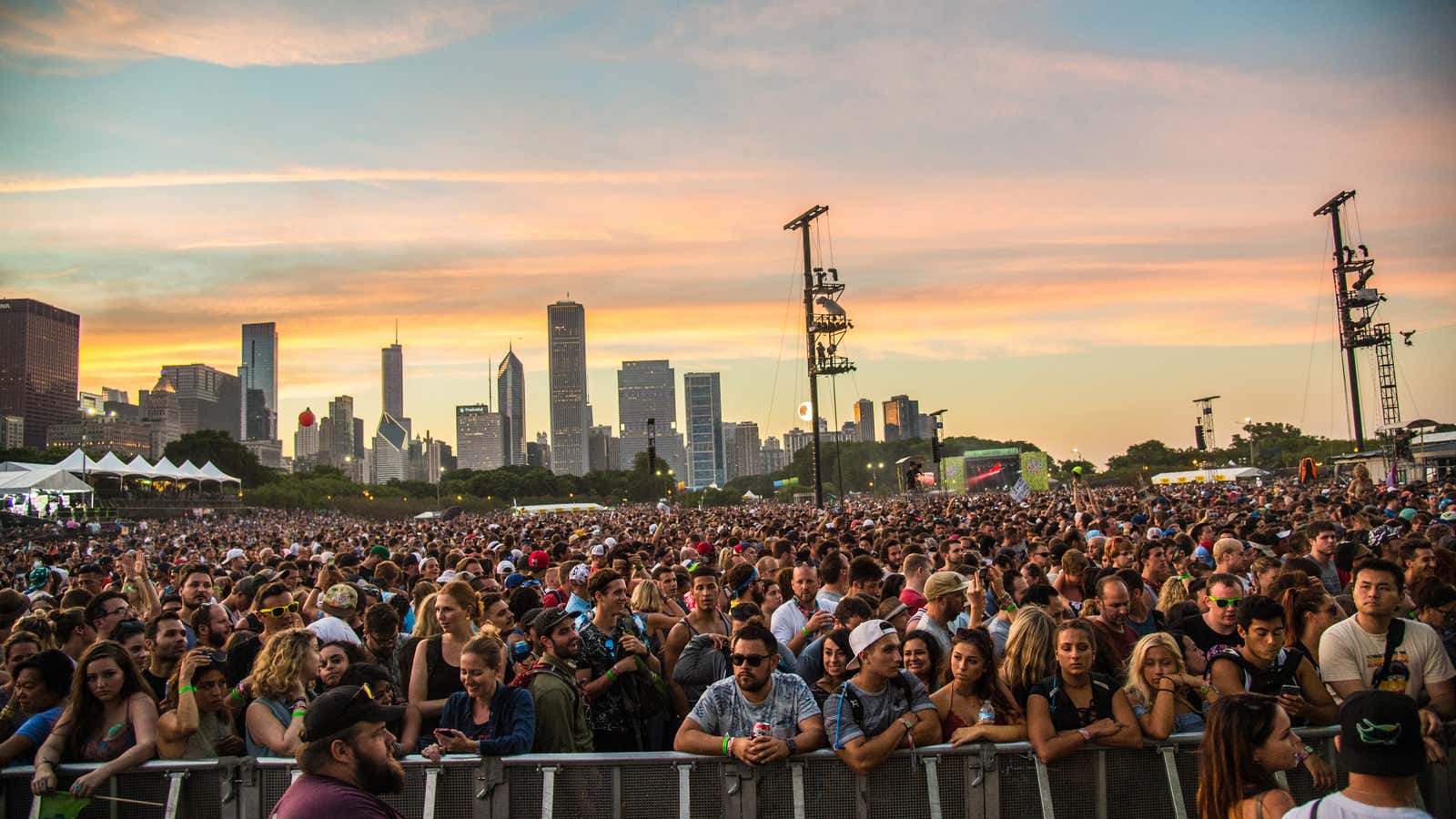Standing in line at the bag check at Chicago’s Lollapalooza music festival last week, my husband and I realized we were vastly outnumbered. The festival, celebrating its 25th year, drew an estimated 400,000 people over four days to Chicago’s Grant Park (including a jubilant Malia Obama). Based on our highly unscientific survey of the crowd on that first day, most of them were under age 25.
By contrast, we were attending the festival on the occasion of my husband’s 35th birthday (I’m 32) and our fifth wedding anniversary. We’re not exactly pensioners, but that first day definitely made us feel out of touch. We were surrounded by a uniform of astounding fashions: glitter body paint dabbed on the chest, backless bathing suits worn as tops, high-waisted shorts, ironic Hawaiian shirts and CamelBak hydration packs. (These kids would definitely have a head start in the zombie apocalypse.) They had so much energy. They didn’t walk, they bounced. They traveled in large packs. They were always looking for people, and/or charging stations, and they shrieked with joy when they found them. They got drunk by 2 pm and threw up on the pavement, or were carried off by friends, or passed out on the lawns. They documented everything with selfies and Snapchat videos. They were unabashedly confident and loud, excited and emotional.
At first, all this made me feel hopelessly grumpy and old. But being surrounded by crowds of excitable youths wound up helping me to confront my anxiety over aging–and start feeling more compassionate towards both my younger self and my present one.
There’s a certain insecurity that comes with aging, and in the last few years I’ve been in the throes of it, railing against the idea that I’m old (or just older) and fighting the fear that I’ve become a stereotype of a tired, anxious and stressed-out 30-something. Between heavy hangovers, earlier bedtimes, an over-scheduled calendar and lots of fretting over life choices, I had all the symptoms of “adulting.” I was not ready to fully embrace my new status.

But Lollapalooza reminded me how far I’ve come. Standing in line at a water bottle filling station gave me a sampling of some of the conversations underway.
“It’s worth it, we’re living in the moment right now.”
“Are you going to be ok?” “I’m just very sleepy.” “I don’t think you’re going to be ok.”
“If you’re doing hallucinogens, orange juice apparently helps. I think that’s a myth, though.”
At first, my husband and I spent a lot of time gaping at the vagaries of youth. By days two and three, however, an older set trickled in. Families with young children and older couples like us navigated the corridors of the festival like Pac-Men, moving strategically to avoid the youngest and drunkest attendees.
My initial annoyance started to give way to a gnawing familiarity. The festival dredged up memories of my teenage years that I thought I had successfully filed under “Best Left Forgotten.” I saw so much of my younger self in the crowd. I’d been an extremely loud teenager. I was boisterous and rowdy and loved to bounce around with my best friend at music festivals. I drank excessively to quiet my insecurities and the burning fear that I was the least attractive and chubbiest of my girlfriends. I had no idea what my limits were with alcohol. I took up smoking to mask my social anxiety and have an excuse to escape conversations. It took me a long time to find my people. In the interim, I spent time with a lot of people I didn’t like, who I tried to impress with a lot of behavior that wasn’t like me.

I have no doubt that plenty of the kids at Lolla were having fun, plain and simple. Being young isn’t as emotionally wrenching for some as it is for others. Regardless, being around them made me feel grateful for the chaos of youth, as horrible as it sometimes felt at the time. All those wild nights and flailing helped me understand what I wanted from life, who I wanted to be around, and what I wanted to achieve.
Lolla also helped me realize that it’s sometimes okay to embody a stereotype. When I was a teen, I acted and behaved like a lot of other people my age, all in an attempt to seem unique. I felt a deep resistance to the idea of conforming. That didn’t change as I got older. Even as I’ve gotten more adept at adult life, I haven’t wanted to admit how much I have in common with my like-minded peers.
But over the weekend, I found myself embracing my evolving idea of what constitutes a fun time–which looks a lot like what you might expect from someone my age. My husband and I rocked out to Radiohead, the Red Hot Chili Peppers and Bloc Party, and danced like idiots to Die Antwoord. I even got a fake tattoo (granted, it was for signing up at the bone marrow donor tent, but still.) But we also left early to avoid the crowds, skipped one night to watch a live taping of the radio show Wait Wait, Don’t Tell Me, and used the amazing Art Institute as a breathing space in between sets.
If the kids at Lolla all looked the same to my husband and me, I bet us older folks all looked the same to them–and I was okay with that. I spent a lot of my youth desperately trying to seem special. But my experience at Lollapalooza finally helped me see that being special doesn’t mean you can’t also be the same.
